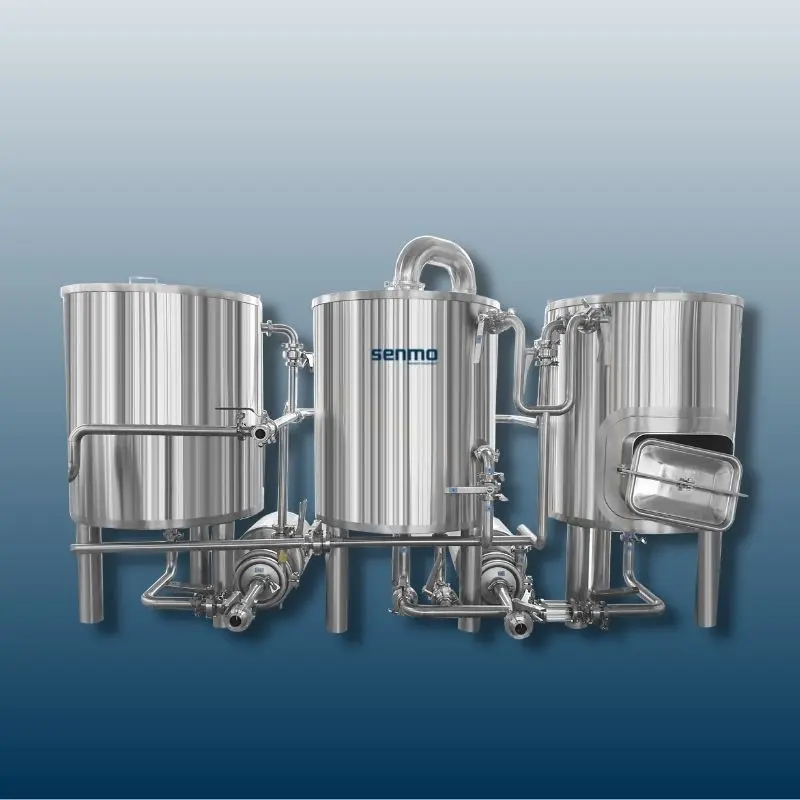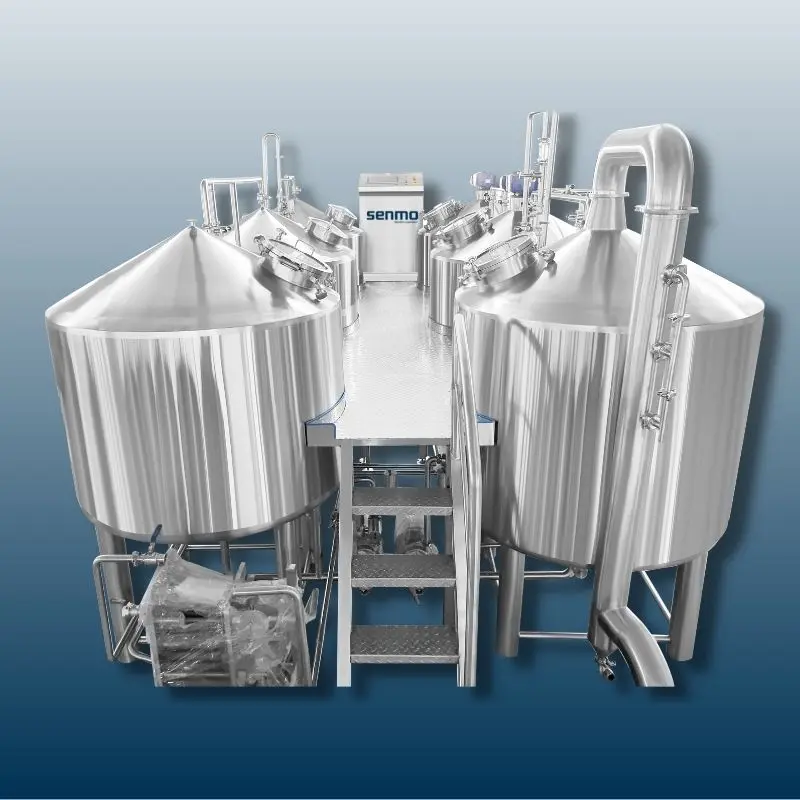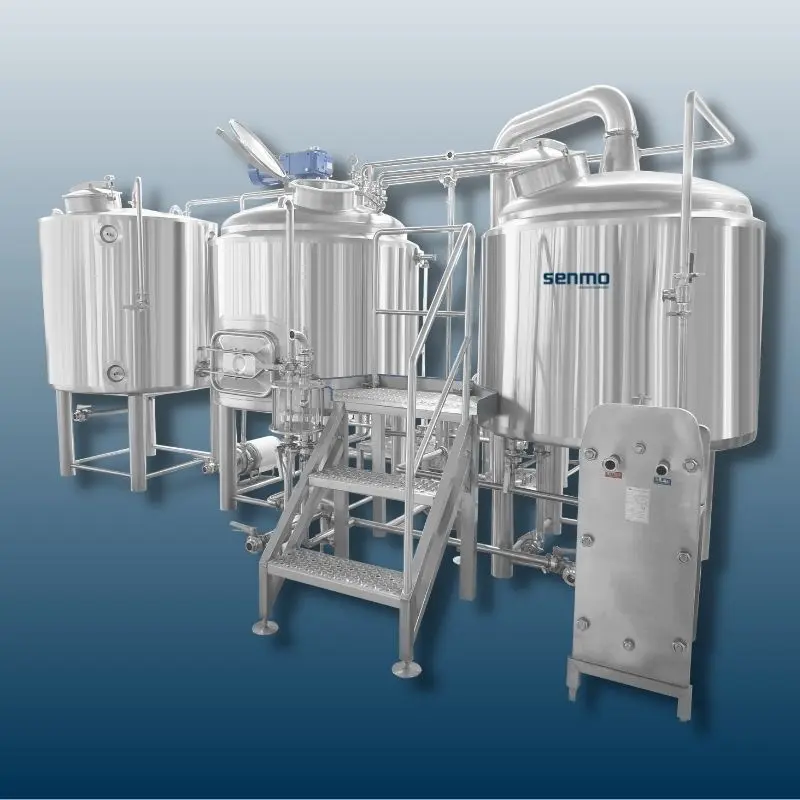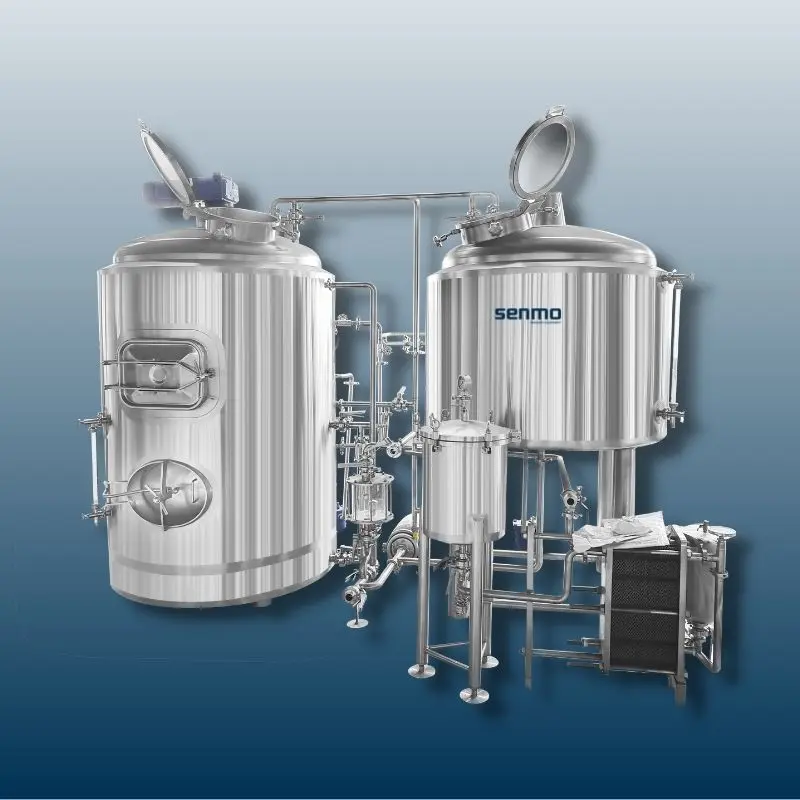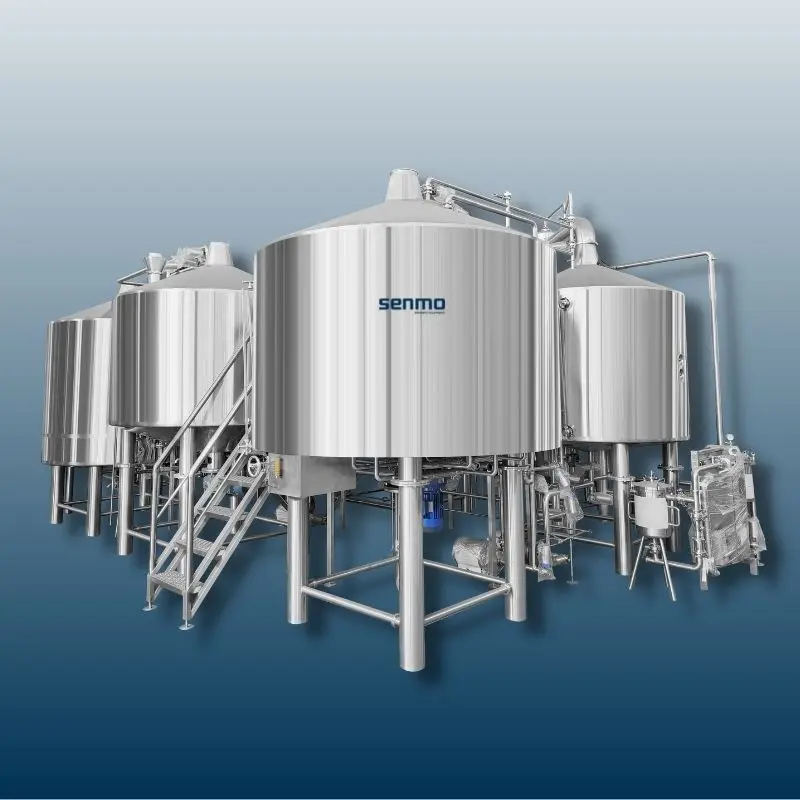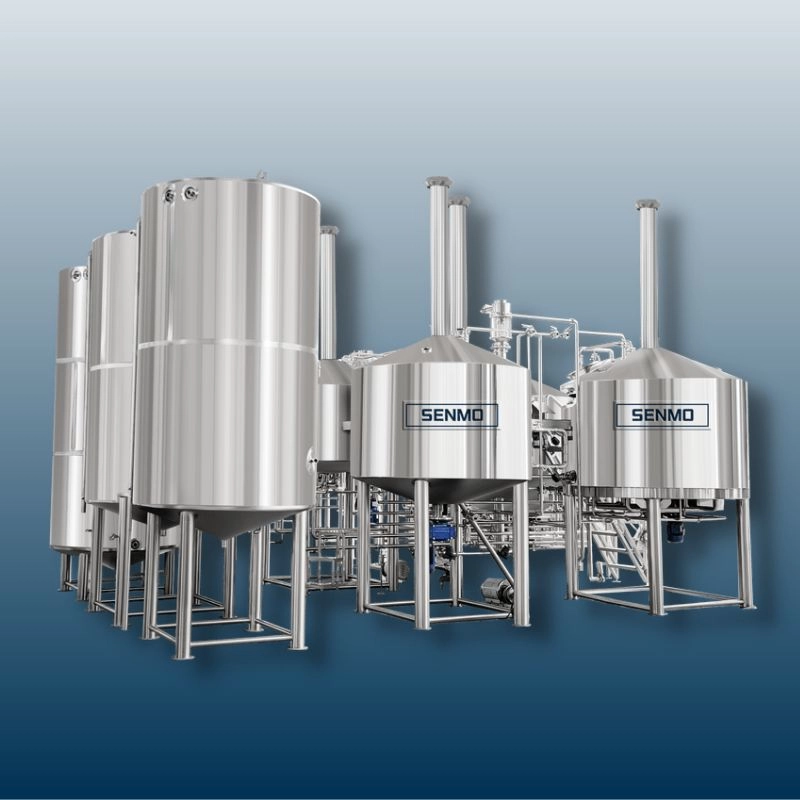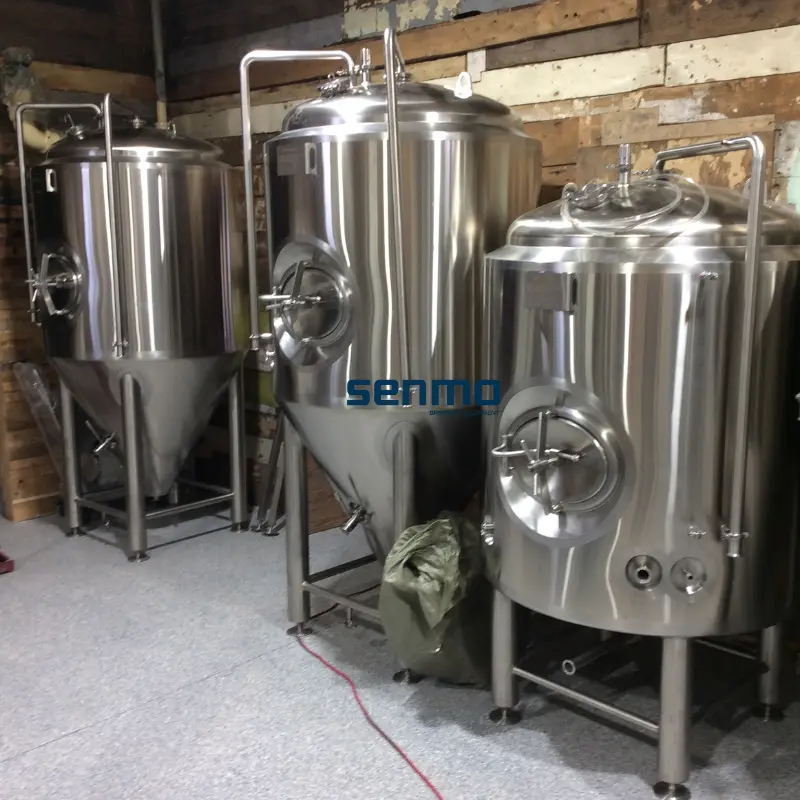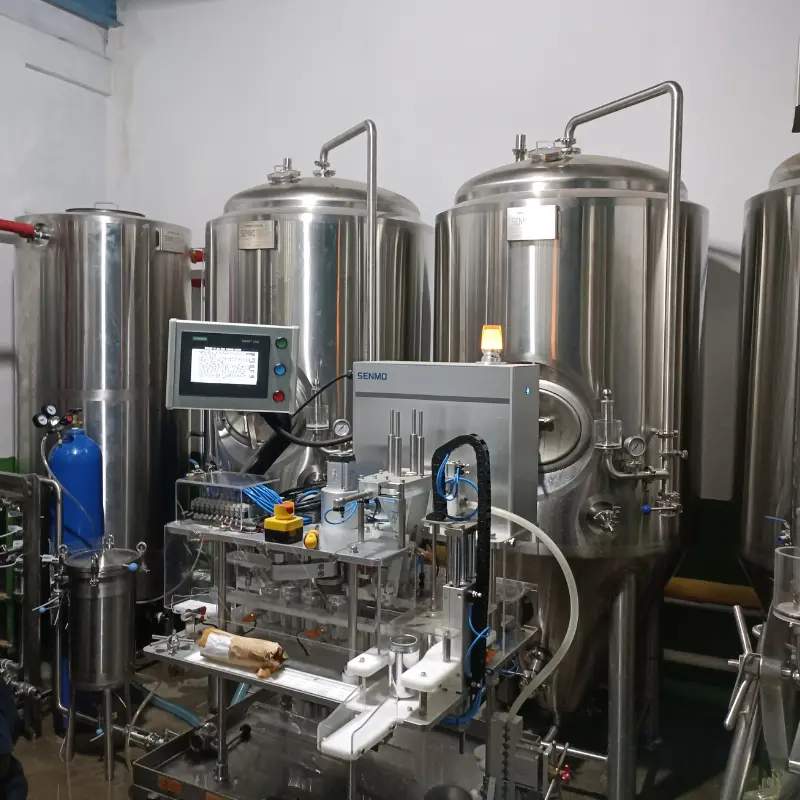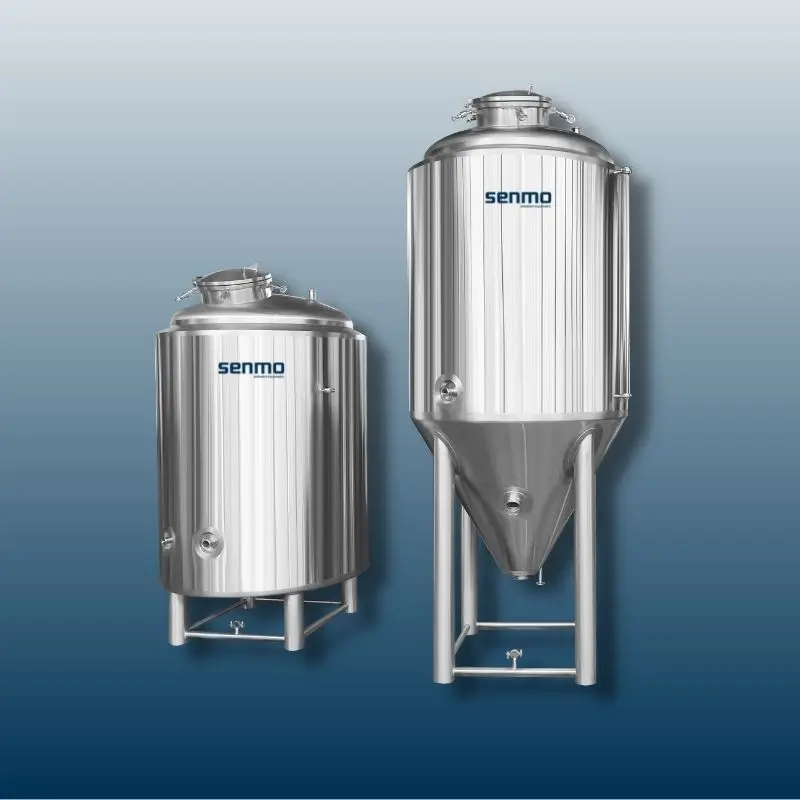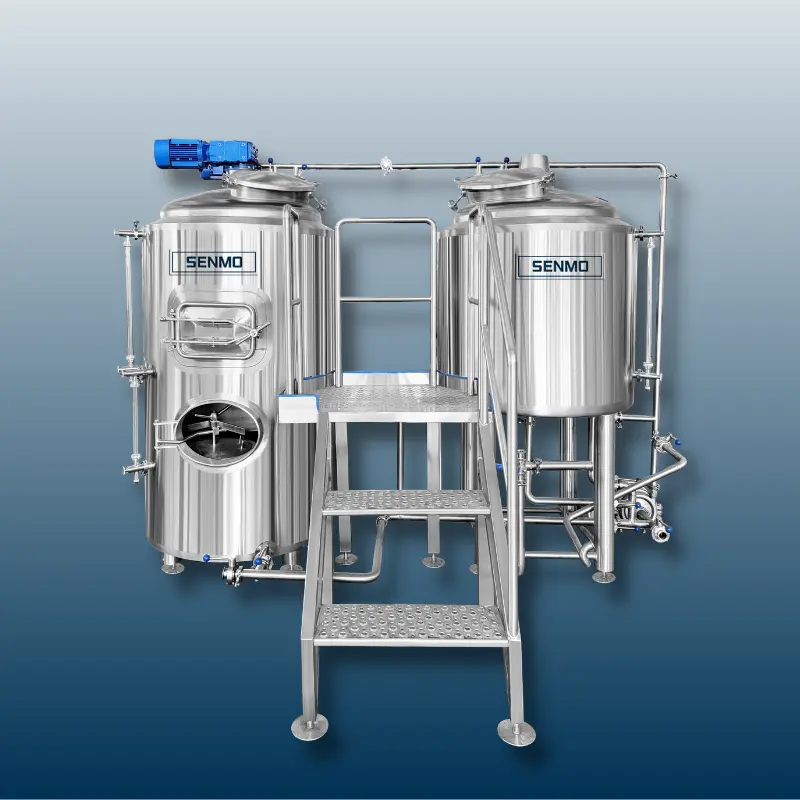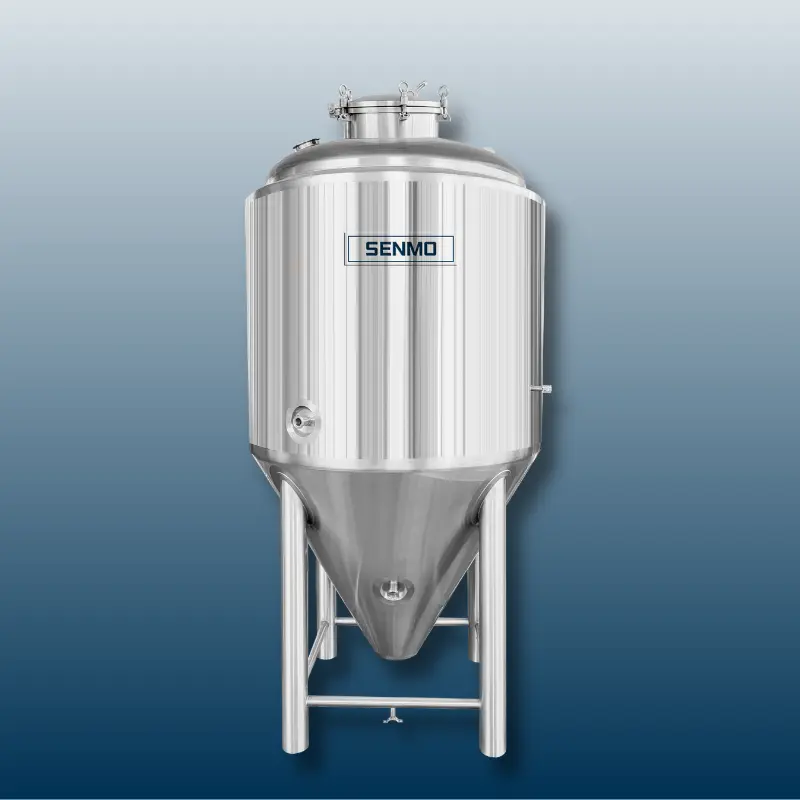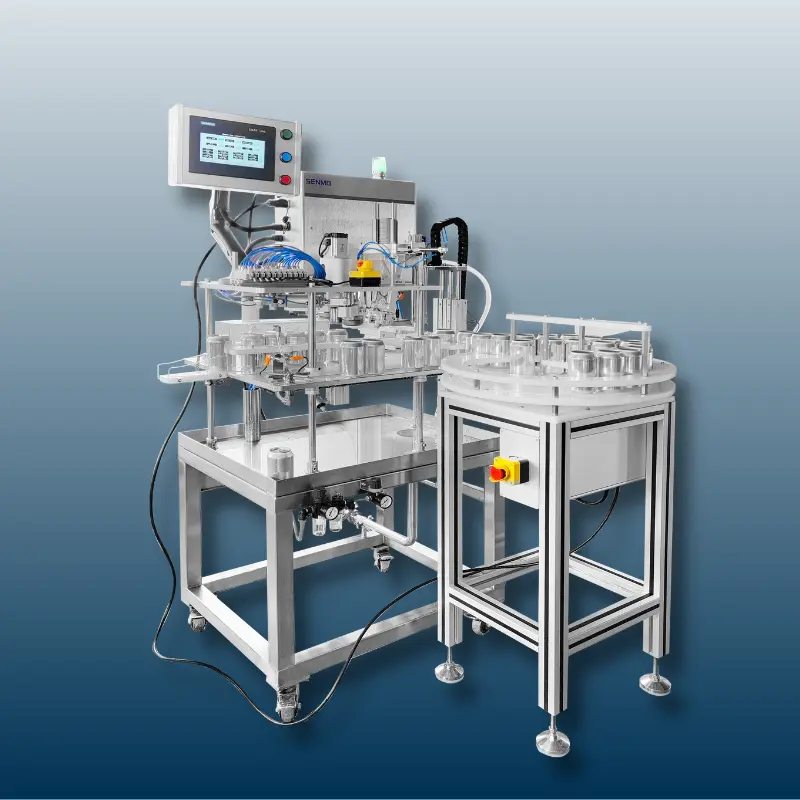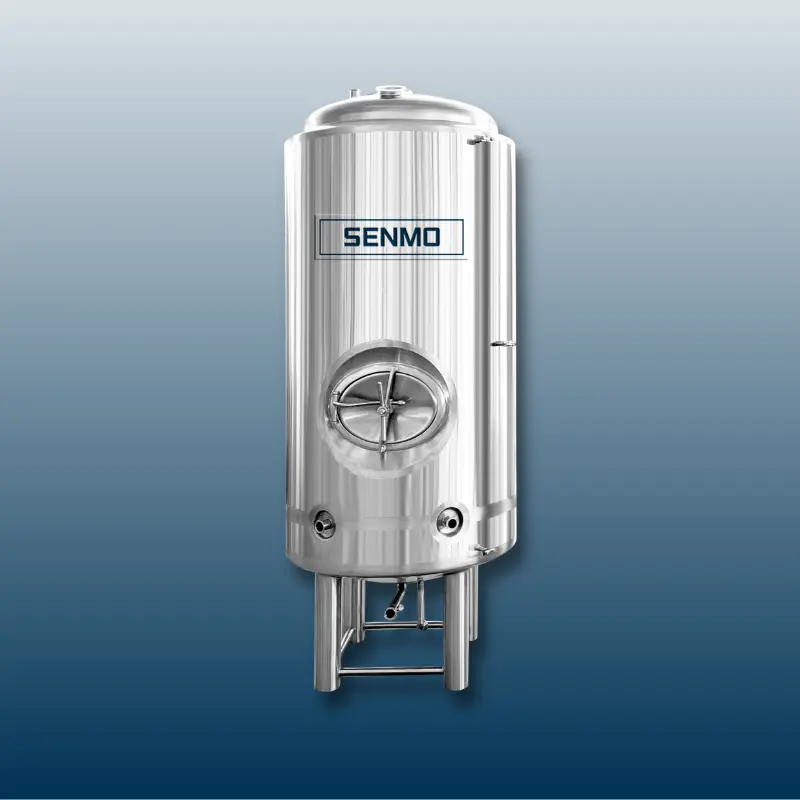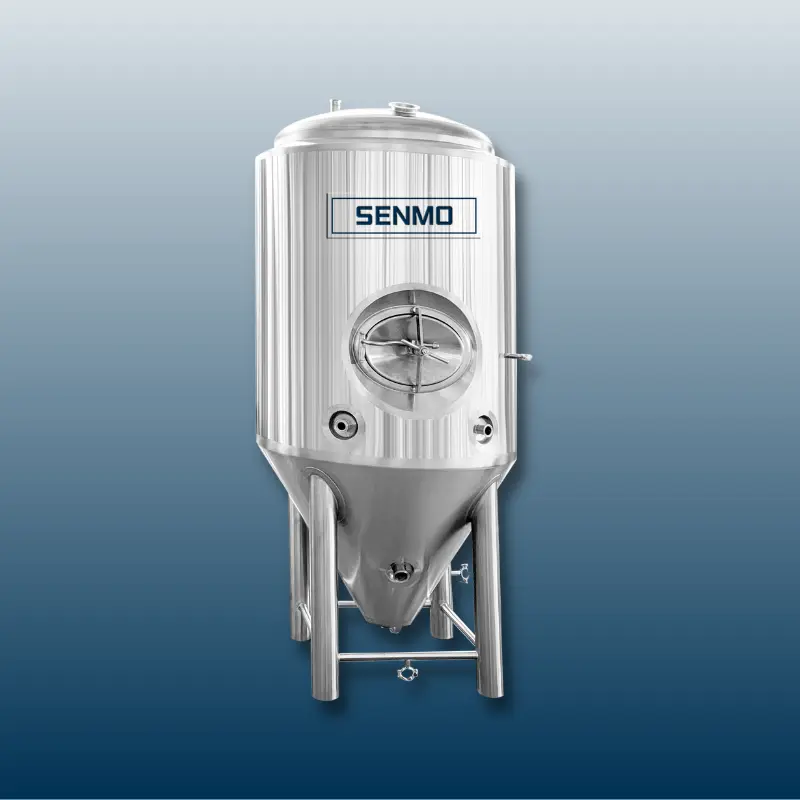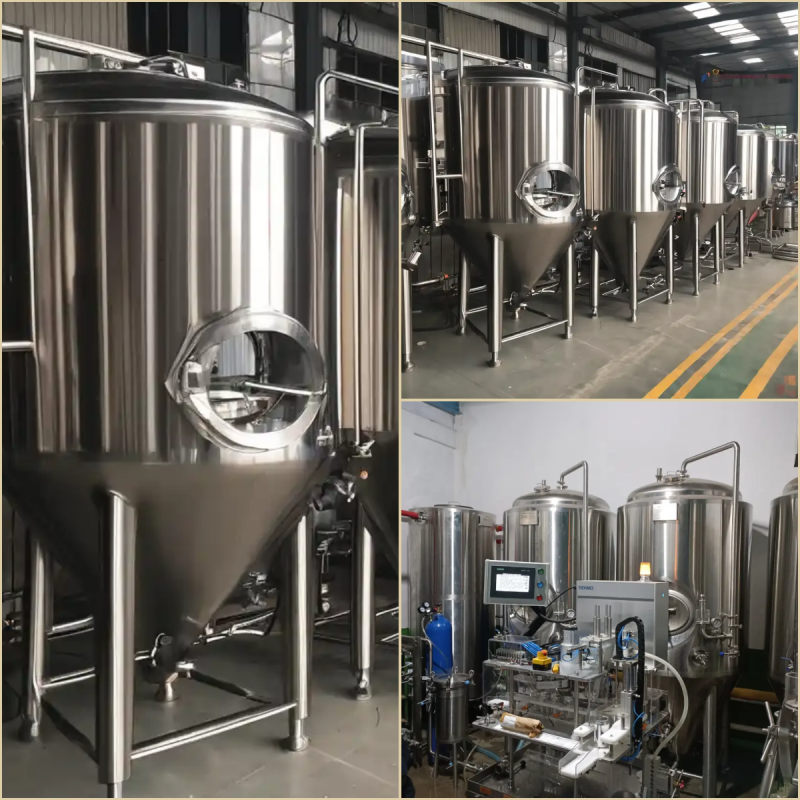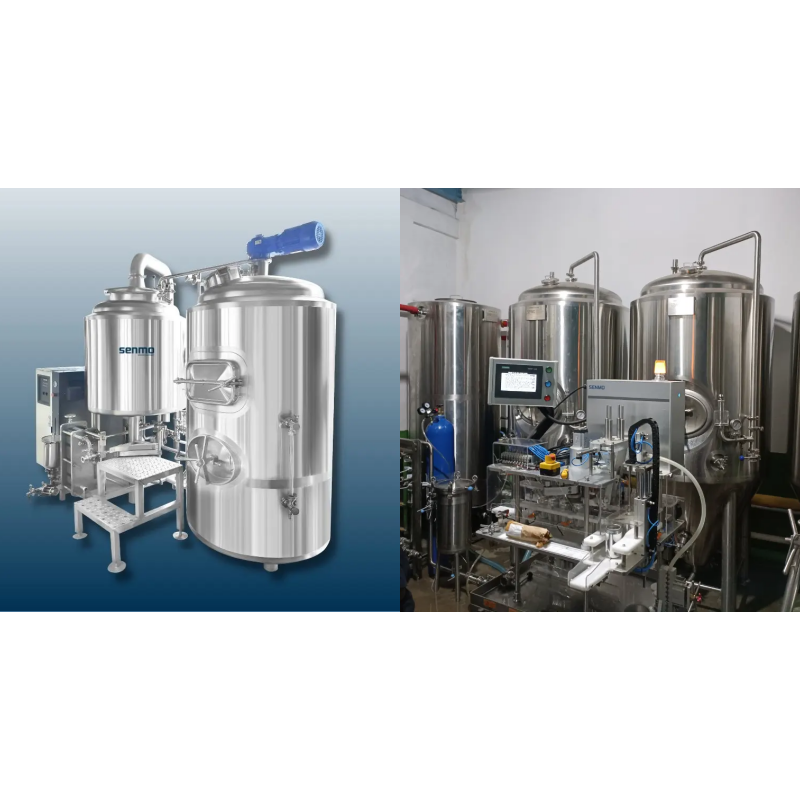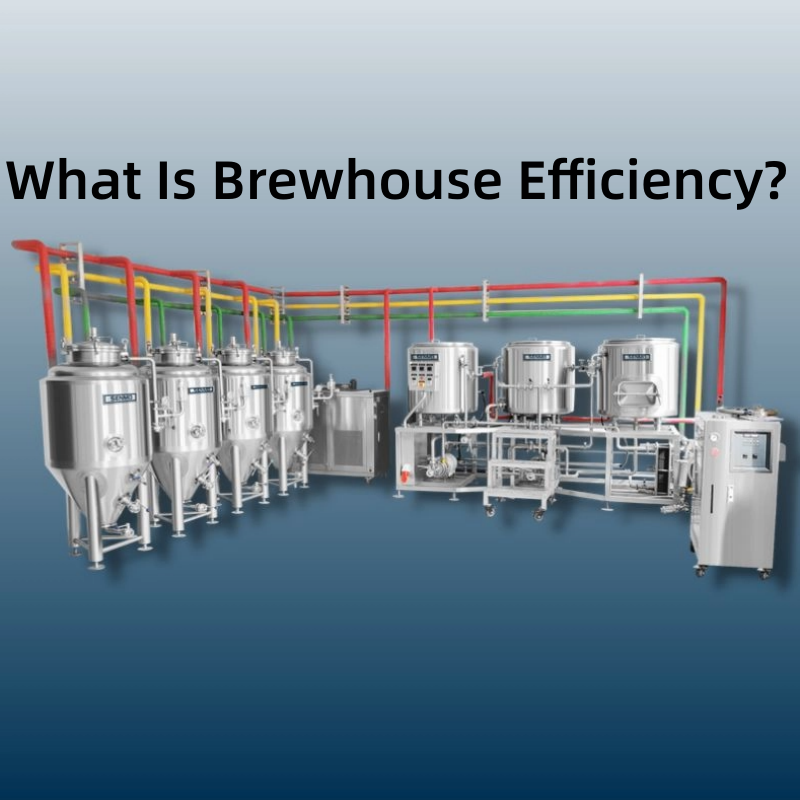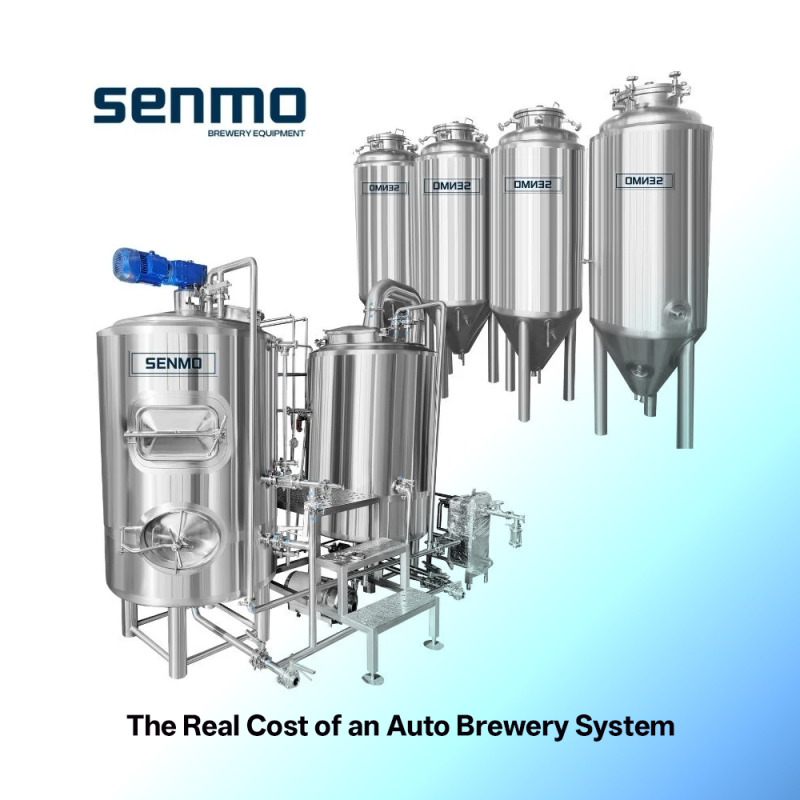A small vessel brewing system generally refers to a group of equipment used to brew beer on a small scale. These systems usually consist of multiple containers, each with a specific function and purpose. The following are the main components of a small brewery container brewing system: mash/lauter tun, boil/swirl tun, fermenter, wine storage tank.
These vessels are usually made of stainless steel and can be insulated to help maintain temperature control during the brewing process. They often include sensors, displays and control panels to help winemakers monitor and manage the brewing process. The transfer of wort between these vessels is usually accomplished by pipes and pumps. The size and capacity of microbrewery vessel brewing systems can be customized according to specific needs.
1-vessel brewing system for small breweries
The 1-vessel brewing system is the most basic brewing system and is suitable for small breweries with low production volumes. The system contains one vessel for mixing malt and water to make wort, which is then boiled and transferred to another vessel for fermentation. This system has the following advantages:
Simple structure, easy to operate and clean
Small footprint, suitable for breweries with limited space
Low price, suitable for small breweries with limited budgets or startups
EX:A small craft brewery called "Senmo Crafty Brews" chose the 1-vessel brewing system. They specialize in producing specialty beers, brewing in smaller batches per brew. They used a fermenter for brewing to experiment with different recipes and flavors of beer. With this simple and flexible system, Crafty Brews is able to quickly adjust and improve their recipes and quickly satisfy the tastes of local beer lovers.
2-vessel brewing system for small breweries
The 2-vessel brewing system is more advanced than the 1-vessel brewing system and is suitable for small to medium-sized breweries. The system consists of two vessels, one for mixing and filtering and the other for boiling and whirlpooling. This system has the following advantages:
More complex structure than the 1-vessel system but still easy to operate and clean
Can improve wort quality and yield
Moderate price, suitable for medium-sized breweries
"Senmo Hop Haven Brewery" is a small brewery who decided to increase production capacity and variety. They opted for a 2-vessel brewing system to brew two different recipes at the same time. One fermenter is used for their classic ales and the other for their seasonal fruit sours. By brewing twice at the same time, Hop Haven Brewery was able to meet market demand more quickly and expand their product line to attract more customers.
3-vessel brewing system for small breweries
The 3-vessel brewing system is more complex than the 2-vessel system and is suitable for medium-sized breweries. The system consists of three vessels: a mixing tank, a filter, and a boiling/whirlpooling tank. This system has the following advantages:
Can further improve wort quality and yield
Can process multiple batches of wort simultaneously
Moderate price, suitable for medium-sized breweries
"Senmo Craft Brew Co." is a growing mid-sized microbrewery. In order to meet the growing market demand and expand their product range, they opted for a 3-vessel brewing system. With three fermenters, Craft Brew Co. is able to simultaneously brew their classic ales, full-bodied stouts, and refreshing wheat beers. This system provided greater flexibility and production capacity, enabling Craft Brew Co. to cater to different customer tastes and further expand their market share.
4-vessel brewing system for small breweries
The 4-vessel brewing system is the most complex and advanced brewing system, suitable for large-scale breweries. The system consists of four vessels: a mixing tank, a filter, a boiling tank, and a whirlpooling tank. This system has the following advantages:
Can handle larger scale wort production
Can process multiple batches of wort simultaneously
Can further improve beer quality and yield, and also has the following advantages:
Can finely control and adjust the wort to meet customers' special requirements
Can quickly transfer and process wort to improve production efficiency
High price, suitable for large-scale beer production
"Senmo Bold Breweries" is a small brewery that has achieved market leadership. To meet growing demand and expand sales nationwide, they opted for a 4-vessel brewing system. With four fermenters, Bold Breweries is able to simultaneously brew a variety of their classic and seasonal beers. This high-volume system ensures that their production capacity can meet market demands while maintaining product quality and consistency.
In addition to the above-mentioned advantages, we can also customize various beer brewing systems of different specifications according to customers' requirements to meet their special needs. Whether it is a 1-vessel or a 4-vessel system, we are committed to providing customers with high-quality equipment and excellent after-sales service.
The choice of which brewing system to use depends on customers' production scale, budget, and production needs. Regardless of the system selected, we will ensure that customers get the best brewing equipment and services to help them produce high-quality beer.
Approximate prices for vessel brewing systems
The price of a beer brewing system varies due to many factors such as scale, configuration, materials, and functionality. Therefore, providing an exact price is impossible, but we can give a rough price range as a reference.
For 1-vessel systems, the price is usually between $5,000 and $10,000. The price of 2-vessel systems is usually between $10,000 and $20,000. The price of 3-vessel systems is usually between $20,000 and $40,000. The price of a 4-vessel system is higher and is usually between $40,000 and $80,000.
It should be noted that these prices are for reference only, and actual prices will depend on many factors, including equipment configuration, materials, scale, and additional features. We recommend that customers contact our sales team for a more accurate quote. Our sales team will provide the most suitable brewing equipment and quote based on the customer's specific needs.
Issues to be addressed through communication
Purchasing a beer brewing system is a significant investment, so it is crucial to communicate thoroughly with the beer equipment supplier. Here are some issues to consider when communicating with the supplier:
Production capacity: Customers need to clarify their production needs and output so that the supplier can recommend the most suitable equipment scale.
Equipment configuration: Customers need to discuss equipment configurations with suppliers, including equipment type, size, materials, heating method, control system, pipeline connections, etc.
Brewing process: Customers need to discuss their brewing process with suppliers so that the supplier can provide corresponding suggestions and equipment. For example, whether the customer needs to carry out special saccharification steps, whether they need additional flavoring tanks, etc.
After-sales service: Customers need to discuss after-sales service and warranty periods with suppliers to ensure that they can receive fast and reliable technical support and maintenance services when needed.
Price and payment method: Customers need to discuss the price, payment method, and payment deadline of the equipment with the supplier.
Transportation and installation: Customers need to discuss the transportation and installation of the equipment with the supplier to ensure that the equipment can be delivered smoothly and installed correctly.
1, 2, 3, and 4 Vessel Brewing System for Small Brewery
Are you a small brewery owner looking to expand your production capabilities and enhance the quality of your craft beer? Our 1, 2, 3, and 4 vessel brewing systems are tailored to meet the specific needs of small breweries, providing you with a versatile and efficient brewing setup. Whether you're just starting out or seeking to scale up your operations, our brewing systems are designed to deliver exceptional results.
Key Features and Benefits:
Flexibility and Scalability: Our brewing systems are available in 1, 2, 3, and 4 vessel configurations, allowing you to choose the system that best suits your current brewing needs while providing room for future expansion as your brewery grows.
Compact Footprint: As a small brewery, space is often a precious commodity. Our brewing systems are designed to maximize brewing capacity within a compact footprint, making the most of your available space.
High-Quality Materials: We use premium-grade stainless steel for the construction of our brewing vessels, ensuring durability, corrosion resistance, and longevity. This guarantees that your investment will serve you well for years to come.
Efficient Heating and Cooling: Our brewing systems are equipped with advanced heating and cooling technology, allowing for precise temperature control during mashing, boiling, and fermentation processes. This results in consistent and high-quality beer production.
User-Friendly Interface: The brewing system is equipped with a user-friendly control panel that simplifies the brewing process. This enables brewers of all skill levels to operate the system effectively and efficiently.
Customization Options: We understand that each brewery has unique requirements. Therefore, our brewing systems offer customization options to cater to your specific preferences, such as additional features, automation, and design aesthetics.
Quality Assurance: Our brewing systems undergo rigorous testing and quality checks to ensure that they meet the highest industry standards. We take pride in delivering reliable and top-notch equipment to our customers.
We are a beer brewing system manufacturer from China, please contact our experts if you need.
Frequently Asked Questions:
1. What is the difference between a 1, 2, 3, and 4 vessel brewing system?
A 1-vessel system combines the mash tun, lauter tun, and kettle in a single vessel. A 2-vessel system has a separate mash tun and lauter tun, while the kettle remains integrated. A 3-vessel system separates all three components, and a 4-vessel system includes an additional whirlpool vessel.
2. How much beer can I produce with each system?
The brewing capacity varies depending on the system size and your specific requirements. Our sales team can provide detailed information about the brewing capacity of each system.
3. Can I expand the brewing system in the future?
Absolutely! Our brewing systems are designed with future expansion in mind. You can upgrade your system or add additional vessels as your production needs grow.
4. Is installation and training provided?
Yes, we offer installation and training services to ensure a smooth transition and proper operation of the brewing system. Our team of experts will guide you through the setup and brewing process.
5. Are spare parts readily available?
We maintain a stock of commonly used spare parts to ensure prompt replacements if needed. Additionally, our customer support team is available to assist with any maintenance or technical inquiries.
6. What kind of beers can I brew with the system?
Our brewing systems are versatile and can be used to produce a wide range of beer styles, from ales to lagers, stouts to IPAs, and everything in between.
7. How does the brewing process work with the 1, 2, 3, or 4 vessel system?
The brewing process with our multi-vessel systems follows a systematic and efficient workflow:
1-Vessel System: In this compact setup, the single vessel performs multiple functions. First, the mashing process takes place where hot water and malted grains are mixed to convert starches into fermentable sugars. After mashing, the lautering process separates the liquid wort from the spent grains. Finally, the kettle function boils the wort with hops to add bitterness and flavor.
2-Vessel System: The separation of the mash tun and lauter tun allows for concurrent mashing and lautering operations. After mashing, the mash is transferred to the lauter tun where the wort is extracted from the grains. The wort is then transferred to the kettle for boiling and hop additions.
3-Vessel System: This system further separates the mashing, lautering, and boiling processes. The mashing vessel is dedicated to converting starches into fermentable sugars, while the lautering vessel efficiently extracts the wort from the grains. The wort is then transferred to the boiling vessel for the final stage of the brewing process, where hops are added and the wort is sterilized.
4-Vessel System: With an additional whirlpool vessel, this system provides enhanced clarity to the finished beer. After boiling, the wort is transferred to the whirlpool vessel, allowing the hot trub and hop residues to settle before transferring the clarified wort to the fermenter.
8. Can I control the brewing process manually or opt for automation?
Our brewing systems offer flexibility in terms of control. You can choose between manual operation, where the brewer has full control over each stage, or opt for automation, where precise temperature and time settings can be pre-programmed, allowing for consistent and repeatable batches.
9. What is the maintenance schedule for the brewing system?
Regular maintenance is crucial for ensuring the longevity and optimal performance of the brewing system. We provide a maintenance schedule and guidelines to help you keep your equipment in top condition. Routine cleaning, inspection of seals, and regular replacement of wear-and-tear parts are some essential aspects of maintenance.
10. Are there any safety features integrated into the brewing system?
Safety is a top priority in our brewing systems. We incorporate safety features such as temperature and pressure monitoring, emergency stop buttons, and safety interlocks to ensure a secure brewing environment for operators.
11. Can I get technical support and assistance post-purchase?
Absolutely! Our commitment to customer satisfaction extends beyond the point of purchase. We offer comprehensive technical support and assistance to address any concerns or technical issues you may encounter during the brewing process.
12. Can I see the brewing system in action before making a decision?
Yes, we encourage potential customers to visit our facility for a demonstration and see our brewing systems in action. This firsthand experience allows you to witness the performance and quality of our equipment, helping you make an informed decision.
We understand the importance of selecting the right brewing system for your small brewery's success. Our team is here to guide you through the process, from choosing the most suitable system to ensuring a seamless installation and providing ongoing support. With our 1, 2, 3, and 4 vessel brewing systems, you can take your craft beer production to new heights and delight your customers with exceptional brews. Reach out to us today, and let's embark on this brewing journey together! Cheers to crafting outstanding beers that will leave a lasting impression on your customers!
In summary, thorough communication with the supplier can ensure that customers receive the best brewing equipment and services to produce high-quality beer.
